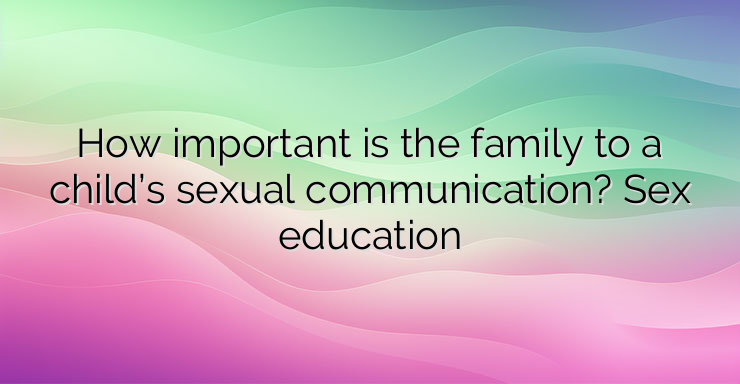In essence, sexual education begins from the first day of life, through the daily care of the baby by its mother and the multiple and continuous stimuli and messages that she emits through this care, which largely affects the child’s body. If this care represents tenderness, acceptance, touches, caresses, good humor and love, then the child has all the guarantees to accept and love the body and its various functions. Therefore, the quality of the mother’s care lays the first foundations for creating a kind of quality for the child’s sexual image of himself and his sexual development, as well as for the understanding of his body and genitals. Therefore, such experiences from the first years of life are the basis of the sexual potential that each of us will have throughout our later life, determining the degree and quality of our characteristics, such as tenderness, sociability and a mood for closeness, sharing and pleasure . During our childhood, we practice our ability to approach, create and maintain relationships, to receive tenderness and care, but also to want to reciprocate it. Only through good care can these capabilities and attitudes be acquired. When it comes to adolescent sexual health, attention and every effort is usually focused on the negative aspects of sexuality and more specifically on possible unwanted pregnancies, abortions and various sexually transmitted diseases. However, our sexuality is much more than that. It is also the joy of sharing intimacy, feelings, pleasure, care and concern and creating a wider and more stable mental balance. Therefore, complete sexuality education includes all the above elements – both positive and possible negative – creating the necessary knowledge and understanding – physical and psycho-emotional – that will form the basis of sexual identity and self-esteem. Sexuality education is the general term that includes sexuality education and information as well as sexuality counseling. It is a very important means of promoting sexual health, which in children and adolescents aims to protect and support their sexual development. Sexual education, however, is not the sole responsibility and obligation of the school, but also of all those who participate in the process of general education of children, so that they become integrated individuals who can share moments and feelings with others and have the conditions to are enjoying themselves. Therefore, important participants in this effort are parents, relatives, kindergarten staff and those who are often involved in the child’s daily life. As mentioned above, formal sex education, where it exists, usually focuses on the risks of unwanted pregnancy, sexually transmitted diseases, and ways to manage those risks. Although these parameters are particularly important,they usually do not reflect or cover the full range of adolescents’ interests and needs and therefore cannot decisively influence their wider sexual behavior and attitudes in a desirable way. For this reason, it is particularly important that any sexuality education includes and focuses on the most positive aspects of young children’s sexual behavior. The first and foremost concern of sex education should be to create a sense of security in adolescents, which means that their privacy and boundaries should be fully respected. Encouraging teenagers to be open and honest is not the same as talking about their personal experiences in front of their classmates. Therefore, the teacher or specialist must ensure that in the classroom and during the sex education course there is an atmosphere of security and confidence, through a general agreement on the boundaries and rules that must be valid and respected, up to the antenna, by all. Some of these rules are accepting that one does not want to answer a question, that all questions are welcome, that everyone’s views should be respected, not demeaned or ridiculed, and, finally, how the principle of confidentiality necessarily applies. What is true of all important life knowledge—that is, acquired through relationships of mutual trust—is true of sex education. Thus, the sex education lesson should be a continuous process of interaction between the teacher/specialist and the adolescents to ensure, as far as possible, that the teaching is based on the real needs and desires of the particular group of adolescents, and not exclusively on a predetermined program. The process is further facilitated by the attitude of the teacher/professional as a catalyst for effective communication rather than as a locus of power. The gender of the adolescents, their characteristics and their different needs should also be taken into account. This means that, on a case-by-case basis, it would be appropriate to temporarily separate the two sexes so that some issues can be discussed more freely and, if possible, with a person of the same gender as the members of each group. Some parents may be deeply concerned and/or disagree with their children’s sex education at school. Usually this is due to a lack of information and various types of “misunderstandings”, which must be respected and the object of efforts to restore them through good cooperation, adequate information and facilitating communication between parents and children on similar issues. Meaningful sexuality education should begin before a child becomes sexually active, be documented by current scientific data, and be based on specific basic principles such as: what begins at birth, how it should be adjusted according to the age, level of development and potential of each child, as well as the fact that factors related to the cultural and social environment must also be taken into account,as well as with the gender of the child. It must also be based on the equality of both sexes, on the possibility of self-determination of what one wants or wants to be, and on the acceptance of any possible difference. In short, sexuality education must reflect the principles of a democratic society based on justice, freedom, equality, solidarity, acceptance, understanding and mutual respect between representatives of the opposite sex, religion, nationality and sexual orientation.


Leave a Reply